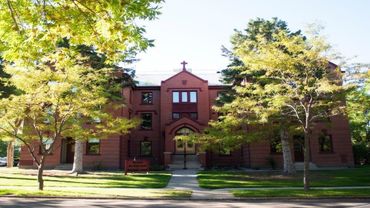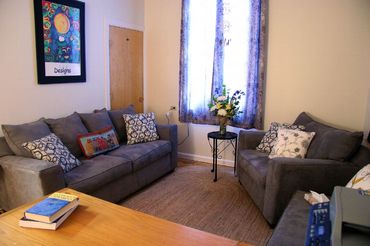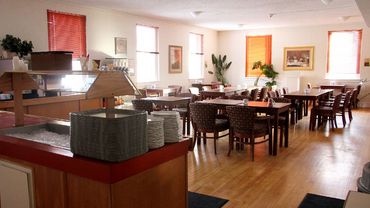
Montana Inpatient and Outpatient Rehab Centers Near Me for Drug and Alcohol Addiction
If you are struggling with drug or alcohol misuse, it can take a toll on you and your loved ones. Reaching out for support and getting treatment can be an important first step in making a positive change in your life; however, you may not know where to begin looking for rehab centers in Montana.
There are several alcohol and drug rehab centers across Montana, including both inpatient and outpatient facilities and detox centers, to help you through the withdrawal process. (Learn more about inpatient vs. outpatient facilities). Browse the ratings and reviews below to learn more about rehabs in Montana so you can find the right type of treatment to get you started on the road to recovery.
Addiction treatment centers in Montana
Open to Travel? Check out Top-Rated Options
All Addiction treatment centers in Montana
Are You Covered For Treatment?
- Helena Rehabs
- Billings Rehabs
- Missoula Rehabs
- Great Falls Rehabs
- Kalispell Rehabs
- Butte Rehabs
- Sidney Rehabs
- Havre Rehabs
- Bozeman Rehabs
- Lewistown Rehabs
Rehab Insurance Coverage in Montana
Rehab Centers in Montana
Information About Rehab in Montana
Latest Reviews
Latest Reviews of Rehabs in Montana
Misfits LLC
Outpatient addiction services. Julie is a wonderful counselor and teachs you how to build meaningful connections in order to build yourself a support system to stay in recovery. Always welcoming no matter how many times you leave.
Rocky Mountain Treatment Center
I wanted to take a moment and share how awesome everyone is here at Rocky Mountain Treatment Center. I have assisted with Insurance, Financial and Admissions for nearly 3 years. I have never known such caring and compassionate people. It is truly an inspiration to see how all of our Professional staff members come together and pull someone out of the darkness and see light-one day at a time. And for all of our Client's and their family members who find peace and start healing. A special thanks for our Client's who have made my job so rewarding to know that I have been such a small part in their recovery process. Many blessings to those who have touched our lives with their hope and success of a new beginning. There are so many individuals out there struggling with drugs and alcohol-yet most people sit quietly waiting for change to happen on its own. Thank you to the wonderful family members who have reached out to get their loved ones treatment. I was told once that a struggling addict touches the lives of at least 20 people! Let's reach out and help them. Let's help them get their life back. They may be our friends, family members, neighbors or even coworkers all struggling with Addiction. I truly believe good people just don't wake up one day and start an addiction. Something, somewhere in their life took a wrong turn. Together, we can all work towards a better happier, healthier life! We may not be your first Treatment Center, but all of us here at Rocky Mountain Treatment Center hope we will be your last! Check us out RehabRocky.com
Drug Addiction in Montana
Montana is facing a substance abuse crisis. Public health departments and hospitals report that substance abuse is one of the most serious health problems in Montana communities. The cost of substance abuse in terms of child welfare, healthcare, and the criminal justice system is putting a strain on the state’s budget.1
Drug overdoses are the cause of approximately 2,500 emergency room visits and inpatient admissions each year in the state. 1
Addiction by the Numbers
- Nearly 250 deaths are attributed to drug overdose per year in Montana.1
- Past-month heavy alcohol use among adults was higher than the national average according to data from 2010-2014. About 62,000 adults aged 12 and older reported heavy alcohol use per year during that time period.2
- Only 8% of people in Montana ages 12 and older that struggled with alcohol abuse or dependence received treatment within the previous year, according to 2010-2014 survey data.2
- Montana data from 2010-2014 found that among individuals ages 12 and older with illicit drug abuse or dependence problems, just 6.9% received treatment within the prior year.2
- The number of people in substance use treatment in Montana, according to single-day counts, increased from 4,429 in 2013 to 5,064 in 2015.4
How Much Does Rehab Cost?
One of the major reasons people don’t seek treatment is due to the cost, but not every program costs the same. The price can vary greatly from free to hundreds of thousands of dollars, depending on the type, length and location of the program you choose, as well as your insurance policy. You may choose a private or luxury facility or a standard outpatient treatment setting.
If you have insurance, it’s likely that your provider will cover at least part of your recovery program, if not all. If you’re not sure what your plan entails, call your insurance company for details concerning your specific plan. If you don’t have insurance, many treatment programs offer ways to mitigate the costs of recovery, including scholarships, payment plans and sliding scales.
Insurance Providers
Treatment Options
Montana has a variety of inpatient and outpatient drug and alcohol treatment centers located across the state in major cities and towns including Anaconda, Billings, Butte, Box Elder, Fort Benton, Fort Harrison, Great Falls, Harlem, Miles City, Libby, and more.3
In addition to substance abuse treatment for adults, Montana offers specialized addiction treatment programs for adolescents, veterans, trauma survivors, people with co-occurring mental health disorders, and other special populations.3 The Crow Nation Recovery Center also has a Tribal Health Department.3
Local Resources for Recovering Addicts
- Crisis Text Line – A crisis service prevention tool that is available to help Montana residents get help. Crisis counselors are available 24/7 via text.
- Montana.gov Chemical Dependency Services and Resources – Chemical dependence resources in Montana, including a list of providers.
- Montana Department of Justice: Resolve to end prescription drug abuse – A variety of information about ending prescription drug abuse.
- Montana Office of Public Instruction: Alcohol and Drug Prevention – Site that offers a variety of links and state resources related to drug and alcohol prevention for students.
- Alcoholics Anonymous Montana – Site helps you find an AA in Montana and learn more about how the program works.
- Montana Region Narcotics Anonymous – State-wide resource for locating meetings and events.
Sources
- Montana.gov. Official State Website. (2017). New report charts practical steps to tackle Montana’s substance abuse problems.
- Substance Abuse and Mental Health Services Administration. (2015). Behavioral Health Barometer: Montana, 2015.
- Substance Abuse and Mental Health Services Administration. (2016). National Directory of Drug and Alcohol Abuse Treatment Facilities 2016.
- Substance Abuse and Mental Health Services Administration. (2017). Behavioral Health Barometer: Montana, Volume 4.














